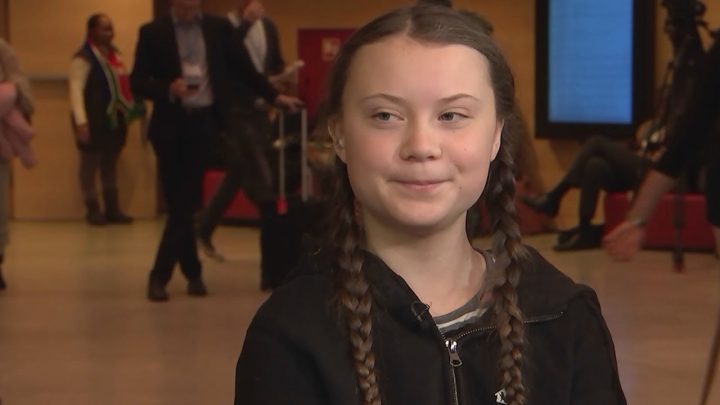Close to 15,000 people have descended on Katowice, in the heart of Poland’s coal country, for the annual U.N. climate change summit. This meeting is dubbed “COP24,” for the 24th “Conference of the Parties” to the climate negotiations. The efforts to curb greenhouse gas emissions and limit global warming have been ongoing since the Rio Earth Summit in 1992. Among those gathered are two young women, from the global North and South, who have decided to devote their lives to reversing humanity’s destructive addiction to fossil fuels, hopefully before it is too late.
“Since our leaders are behaving like children, we will have to take the responsibility they should have taken long ago,” said Greta Thunberg, a 15-year-old climate activist from Sweden, addressing U.N. Secretary-General Antonio Guterres here last week.
Greta first began studying the issue of climate change at the age of 9. She said on the “Democracy Now!” news hour at COP24 that over time she “fell into a depression. I didn’t see any point of living, because everything was just so wrong.” She stopped eating, stopped talking. Her father, an actor, and her mother, a world-famous opera singer, stopped work to stay with her, caring for her through this difficult period, through her recovery. “I thought that I could do so much with my life,” she said. “What is the point of feeling like this, when I could actually do something good?”
Greta has Asperger’s. Because of this, she said, “I work a bit different. I see things black and white. I guess I saw the world from a different perspective.”
Starting last August, Greta began a “school strike,” standing in front of the Swedish Parliament instead of going to school. After Sweden’s elections in September, she resumed school, maintaining her strikes on Fridays.
Renowned climate scientist Kevin Anderson tweeted: “On climate change, Greta Thunberg demonstrates more clarity & leadership in one speech than a quarter of a century of the combined contributions of so called world leaders. Willful ignorance & lies have overseen a 65 percent rise in CO2 since 1990. Time to hand over the baton.”
Nearing midnight on Wednesday at COP24, Greta addressed a plenary session: “Our civilization is being sacrificed for the opportunity of a very small number of people to continue making enormous amounts of money. Our biosphere is being sacrificed so that rich people in countries like mine can live in luxury. It is the suffering of the many which pays for the luxuries of the few.”
Joanna Sustento is a 26-year-old climate survivor from the Philippines who knows that suffering too well. “I had a happy life, a good job, great friends and a wonderful loving family. But in a matter of minutes, all of that changed,” Joanna said in a Greenpeace Philippines video, describing November 8, 2013, when Typhoon Haiyan hit her home city of Tacloban.
“Typhoon Haiyan killed more than 10,000 people and left over 14 million people homeless,” she said on “Democracy Now!” in Katowice. “I witnessed my mother, my father, brother, sister-in-law and my 3-year-old nephew being swept away by the storm surge. It left my brother and me to search for our family’s bodies in the aftermath. We never found our father and our nephew. It’s difficult to be the one left behind. We have to deal with all the questions, the grief, the pain and the regrets.”
Joanna then described a first-of-its-kind effort to hold polluting corporations, called the “Carbon Majors,” accountable: “Shell, BP, Chevron, ExxonMobil, Suncor, Lukoil … those are just some of the 47 companies present in the Philippines. A petition was filed in 2015 by typhoon survivors, fisherfolk, farmers and other environmental organizations at the Commission on Human Rights of the Philippines to investigate oil, coal and gas companies for their responsibility for human-rights violations resulting from climate change.”
Like Greta Thunberg, Joanna Sustento is in the struggle for climate justice for the long haul. “I see that there is so much power in the people out there, so much power to pressure our governments, corporations, to change the current system,” she said.
Greta closed her plenary remarks Wednesday night, concluding: “You have run out of excuses and we are running out of time. We have come here to let you know that change is coming whether you like it or not. The real power belongs to the people.”
At COP24, held at a conference center atop an old coal mine, in a part of the world that has witnessed the worst ravages of war, the gathered heads of state and their climate negotiators should listen to the words of these two wise, young women.






